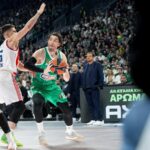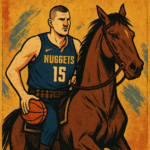With an extended roster of 19 all-time players waiting in the wings, Ball in Europe today releases the names of the Dream Team Europe coaching staff. To manage this elite squad, we’ll limit Dream Team Europe to four coaches in spite of reader Simas’ excellent (if unwieldy) solution reckoning that “if you have a coaching staff as big as NBA teams have with 53 assistant coaches, you can just write all the European coaches that come to mind.”
Without further ado, then, BallinEurope.com presents the greatest basketball managerial quartet never assembled: The Dream Team Europe coaching staff!

Gomelsky with USSR hero Sergey Belov
To head things up, we’re going to take The Continent’s own Red Auerbach over its Phil Jackson – and make no bones about it: Alexander Gomelsky does belong in a conversation with Mr. Celtic and the Zen Master. After all, Gomelsky paralled Auerbach’s Boston Celtics’ ridiculous run of nine NBA championship titles between 1957-1967 with nine Soviet Union league titles for CSKA Moscow in the 1970s. (This after bagging five national titles and three straight European Cups with ASK Riga.) Plus, CSKA played in the Euroleague finals three times during this period and took it all in 1971.
Oh, and those fearsome national teams that stomped international competitions for decades while instilling a profound fear of the dread acronym CCCP across the basketball universe? Gomelsky’s. Over three decades leading up to the team’s dissolution, Gomelsky and Team USSR took one Olympic gold (two if you count the 1972 win, for which Gomelsky was denied a passport and thus did not coach – ah, the Commie days), two silver and three bronze medals. At EuroBasket, he scored eight golds (including five consecutive from his first turn in 1962-63) and two silvers. He added two more golds to the USSR coffers with wins at the FIBA Worlds in 1967 and 1982 (the Soviets also took it all in 1974 but Gomelsky again stayed home), together with silvers in … ah, but you get the idea.
It’s no wonder the Euroleague coach of the year award is named for Alexander Gomelsky. In Europe, he is The Coach.
 As for a Continental equivalent of the NBA’s Dr. Phil, how about Željko Obradović? Though he travels a bit more frequently than the Zen Master, Obradović has a similar record of success with regard to titles earned, and a similar style of management that, like Jackson, gives Obradović’s star-studded teams that something extra to put them over the top.
As for a Continental equivalent of the NBA’s Dr. Phil, how about Željko Obradović? Though he travels a bit more frequently than the Zen Master, Obradović has a similar record of success with regard to titles earned, and a similar style of management that, like Jackson, gives Obradović’s star-studded teams that something extra to put them over the top.
Obradović’s playing career paralleled Jackson’s somewhat as well in playing some years with a storied franchise (for Obradović, Partizan Belgrade; for Jackson, the New York Knicks) while mostly overshadowed by bigger names (Vlade Divac, Sasha Djordjevic, Žarko Paspalj; Bill Bradley, Dave DeBusschere, Walt Frazier, Willis Reed). Naturally befitting both coaches, each earned a reputation for intelligent play beyond basketball skills.
While Obradović did not have to work his way up the ranks with a Yugoslavian equivalent of the Albany Patroons, success as a coach at the highest level came Jacksonian easy to Obradović: The former Partizan player made his team the Euroleague champions and triple-crown winners in his second year as coach. (Even Phil had to wait ‘til his third season as Chicago Incredibulls coach to take it all.)
Finally, Obradović has found inheriting an almost-there franchise and coaching them to the championship among his skills as well. He’s led Joventut Badalona to its only Euroleague title, Real Madrid to its last Euroleague title, and of course Panathinaikos Athens to its insane four Euroleague titles in nine years plus 10 other Greek League championships and cups in the same period.
And we haven’t even started on his national team CV. No matter: Sure as Phil Jackson is one of the NBA’s top two coaches of all-time, so too is Željko Obradović for Euroleague.
(Meanwhile, Obradović needs three more Euroleague championships to tie Jackson’s mark? And Panathinaikos is the favorite this season? Hmm…)
 Speaking of Euro-touring coaches, welcome Božidar Maljković to the Dream Team Europe staff. By any measure, Maljković turned in one of the all-time great stretches for a basketball coach over a ten-year span.
Speaking of Euro-touring coaches, welcome Božidar Maljković to the Dream Team Europe staff. By any measure, Maljković turned in one of the all-time great stretches for a basketball coach over a ten-year span.
After paying his dues as an assistant coach for Red Star Belgrade from 1981 to ’86, Maljković was unleashed to launch an assault on any team in Europe which didn’t hire him. In 1989 and ’90, Maljković’s KK Split teams took the Euroleague title. For 1990/91, Maljković jumped to FC Barcelona, where L’equip blaugrana finished second in the top league. In 1992, the coach got with Limoges for a four-season stint in which the team won its only Euroleague title in 1993. After France, it was onto Panathinaikos Athens, where Maljković celebrated his tenth anniversary as a world-class head coach by winning the Greens a Euroleague title in 1996.
Though the garnering of national titles and championships has slowed for Maljković in the following years, the man has fielded top teams with Unicaja, Real Madrid and TAU Cerámica in this decade. Since he’s currently unemployed, Maljković will certainly be happy coaching his old charges Dino Raja and Toni Kukoc for Dream Team Europe. But we’ll take the 1986-96 version of Maljković, please.
 Finally, we’re going with a contemporary whose peak may yet be ahead: Ettore Messina. It is often said that though millions of people pay to see professional sports every year, very few of these are paying to see a coach. (Bobby Knight excepted, presumably.) On the other hand, Real Madrid fans anxiously await the 2009-10 precisely because of a guy who doesn’t leave the sideline: Messina the maestro.
Finally, we’re going with a contemporary whose peak may yet be ahead: Ettore Messina. It is often said that though millions of people pay to see professional sports every year, very few of these are paying to see a coach. (Bobby Knight excepted, presumably.) On the other hand, Real Madrid fans anxiously await the 2009-10 precisely because of a guy who doesn’t leave the sideline: Messina the maestro.
Messina’s four Euroleague titles in ten years would be enough to put him on this list, but Messina can also boast Russian and Italian league titles, plus a sweet silver medal for Team Italy at the 1997 EuroBasket competition. And CSKA Moscow fans will without hesitation back this choice based solely on the restoration of that team’s aura of invincibility, in four years leading The Red Army to four Euroleague finals appearances and two Euroleague championships.
Right. With the coaching staff now in place, this crew will be putting the 19 would-be Dream Team Europe players through the paces in training camp. A report from the greatest training camp ever held is forthcoming, along with cuts to the roster.
<p style=”text-align: center;”><a href=”http://www.euroleague.net/” target=”_blank”><img title=”Euroleague TV banner” src=”http://bietemp.wpengine.com/wp-content/uploads/2013/03/Euroleague-TV-banner.jpg” alt=”” width=”300″ height=”70″ /></a></p>



